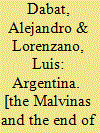| Srl | Item |
| 1 |
ID:
140921


|
|
|
|
|
| Publication |
Mexico City, Conflicto Malvinense y Crisis Nacional, 1982.
|
| Description |
205p.pbk
|
| Standard Number |
0860910857
|
|
|
|
|
|
|
|
|
|
|
|
Copies: C:1/I:0,R:0,Q:0
Circulation
| Accession# | Call# | Current Location | Status | Policy | Location |
| 025469 | 982.064/DAB 025469 | Main | On Shelf | General | |
|
|
|
|
| 2 |
ID:
089754


|
|
|
|
|
| Publication |
2009.
|
| Summary/Abstract |
As oil companies prepare to begin a new round of exploratory drilling for oil off the coast of the disputed Falkland (Malvinas) Islands, article assesses the local government's low-key policy of attemping to play down hopes of an economic bonanza.
|
|
|
|
|
|
|
|
|
|
|
|
|
|
|
|
| 3 |
ID:
084348


|
|
|
|
|
| Publication |
2008.
|
| Summary/Abstract |
This paper studies the process of prenegotiation and the role of mediators between the Argentine and British governments concerning the sovereignty dispute of the Falkland/Malvinas Islands between 1982 and 1990. During this period, the relationship between both governments evolved from rupture and norelations to an agreement on the conditions to negotiate the renewal of full diplomatic relations which was concluded in early 1990. In a preliminary process of prenegotiation, the governments of Switzerland, initially, and the United States played a role in helping to reach an agreement. The former failed when the talks ended abruptly in July 1984. The latter succeeded in getting both parties to the table and keeping them there, thus avoiding a potential rupture until the two parties reached an agreement in principle. During the prenegotiation stage, the principal parties were able to reduce the risks of escalation; they defined and narrowed the boundaries of the dispute, clearly identified the trade-offs, and structured the agenda of formal negotiations. Consequently, the likelihood of successful negotiation improves significantly when the parties reach an agreement during prenegotiation on what will be discussed later. This case also illustrate that sometimes, when negotiations reach a point of stalemate, a mediator can help to find a "zone of agreement." When this situation occurs, the degree of involvement and the resources of the mediator are particularly important. Finally, this case confirms the assertions that effective mediation is more a matter of leverage and influence than a matter of impartiality.
|
|
|
|
|
|
|
|
|
|
|
|
|
|
|
|